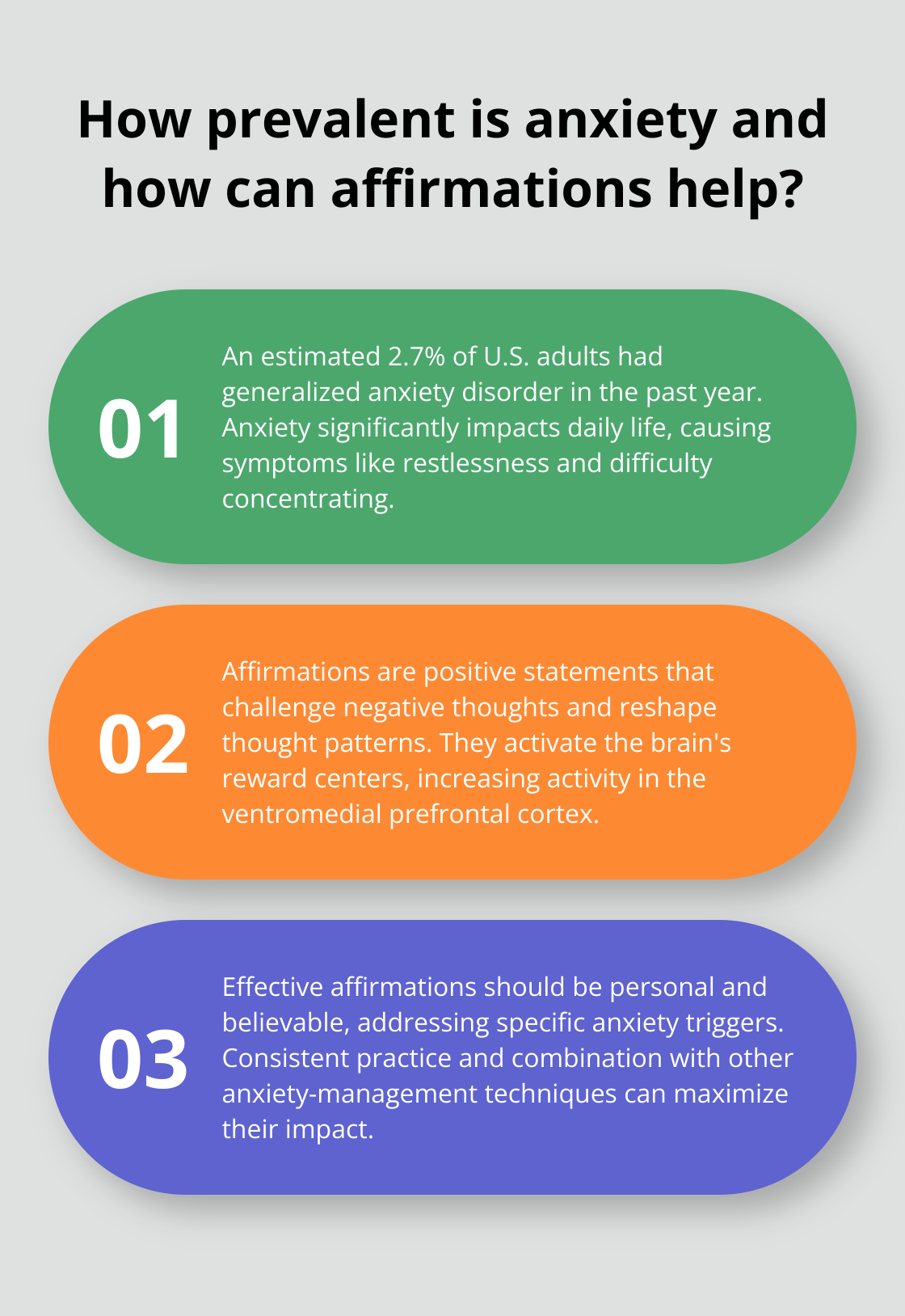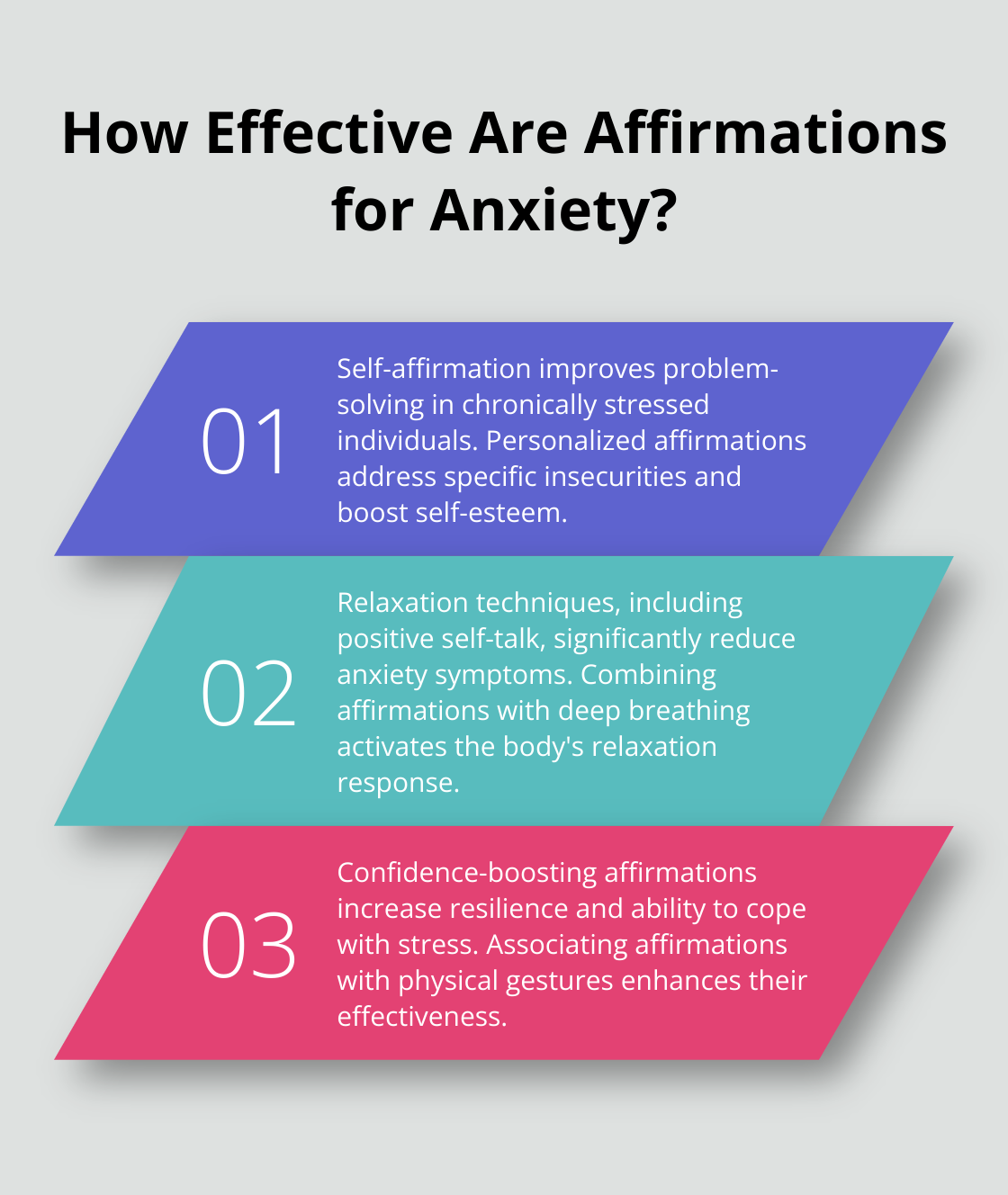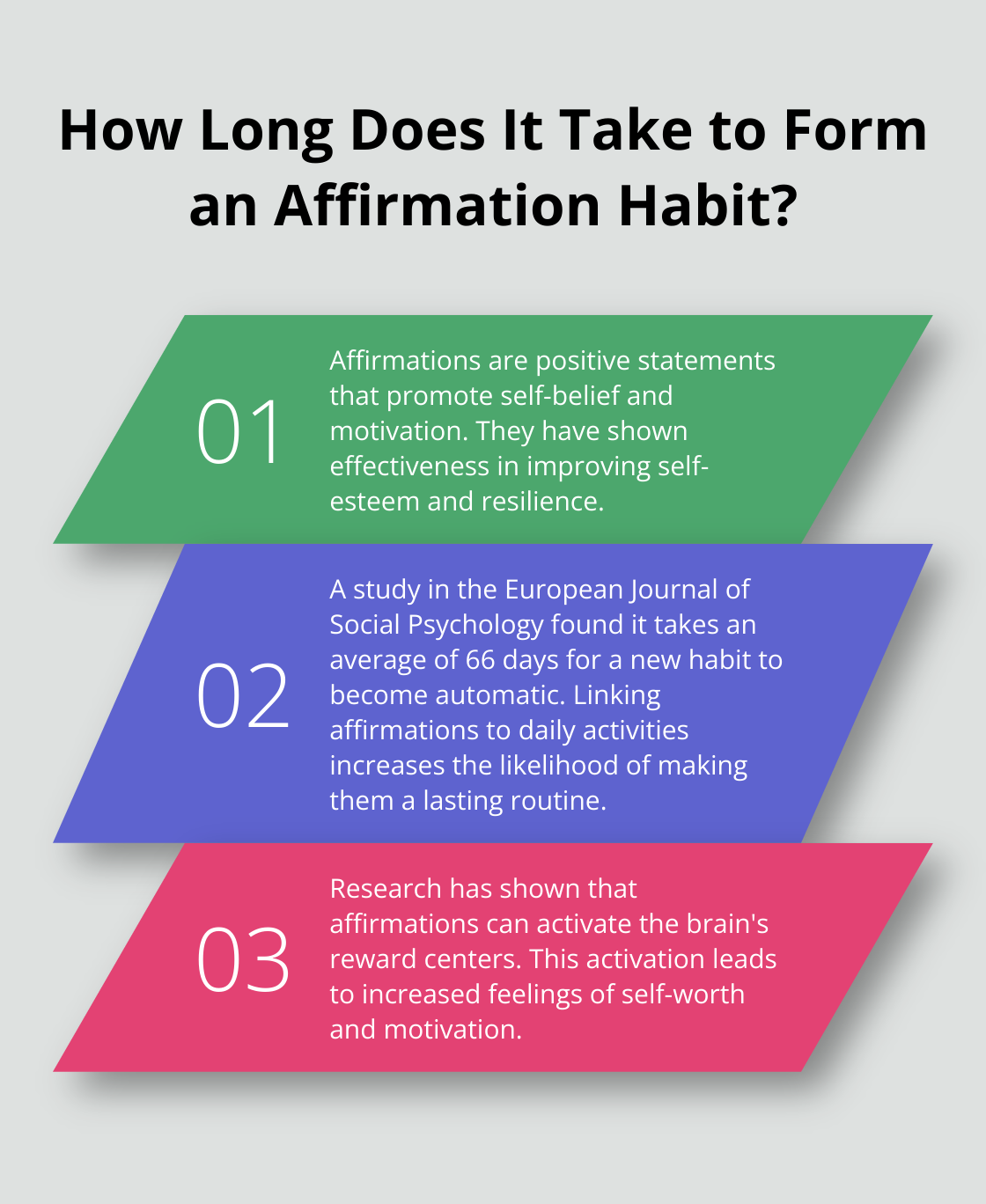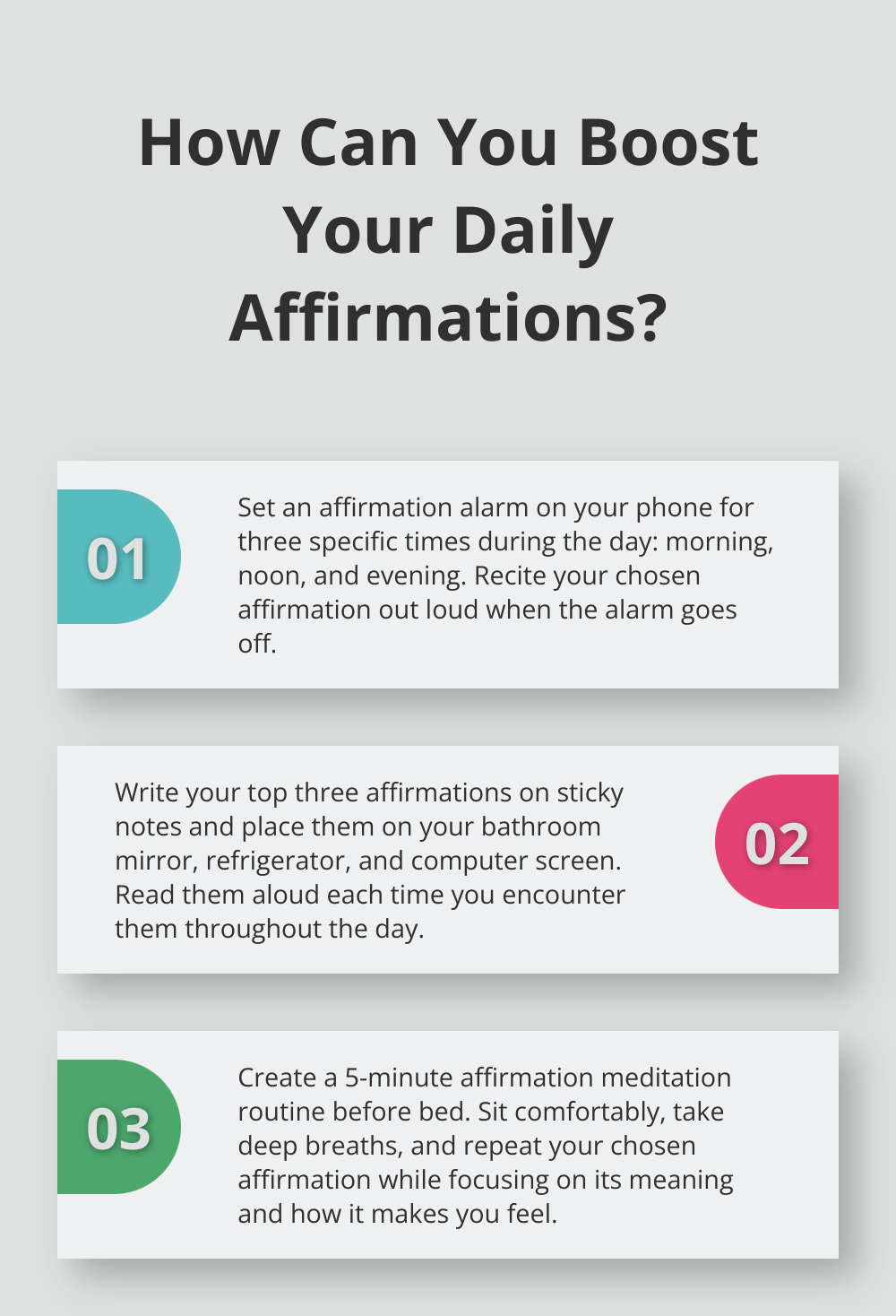Anxiety can be a challenging companion in our daily lives, affecting millions worldwide. At Global Positive News Network, we believe in the transformative power of positive thinking to combat these struggles.
Daily affirmations and positive affirmations for anxiety offer a simple yet effective tool to reshape our mental landscape. This blog post explores how these powerful statements can ease anxiety and promote overall well-being.
What Is Anxiety and How Can Affirmations Help?
Understanding Anxiety
Anxiety transcends ordinary stress or worry. It manifests as a persistent state of fear or apprehension that significantly impacts daily life. The National Institute of Mental Health reports that an estimated 2.7% of U.S. adults had generalized anxiety disorder in the past year. Common symptoms include restlessness, difficulty concentrating, and physical manifestations like rapid heartbeat and sweating.
The Power of Positive Self-Talk
Affirmations are positive statements that challenge and overcome self-sabotaging and negative thoughts. They function by repeatedly exposing our minds to positive and empowering ideas, gradually reshaping our thought patterns. Dr. Emily Anhalt, clinical psychologist and co-founder of Coa, states, “Affirmations can help us develop a more positive mindset, which in turn can reduce anxiety and improve overall mental health.”
The Science Behind Affirmations
Recent neuroimaging studies reveal that practicing self-affirmation activates the brain’s reward centers. A study published in Social Cognitive and Affective Neuroscience found that self-affirmation increased activity in the ventromedial prefrontal cortex (an area associated with positive valuation and self-related information processing).
Practical Application of Affirmations
To effectively use affirmations for anxiety relief, make them personal and believable. Start by identifying your specific anxiety triggers and create affirmations that directly address them. For example, if you often worry about your capabilities at work, an affirmation like “I am competent and capable in my job” can prove powerful.
Maximizing the Impact of Affirmations
The effectiveness of affirmations lies in their consistent practice. Dr. Kristin Neff, a pioneer in self-compassion research, recommends incorporating affirmations into daily routines. This could involve reciting them during your morning commute, writing them in a journal before bed, or setting reminders on your phone throughout the day.
Affirmations can amplify their impact when combined with other anxiety-management techniques. Mindfulness meditation, deep breathing exercises, and regular physical activity can all complement an affirmation practice, creating a comprehensive approach to anxiety relief.

As we move forward, let’s explore specific daily affirmations that can help ease anxiety and promote a more positive mindset.
Powerful Affirmations to Ease Anxiety
Affirmations are potent tools for reshaping our mental landscape and easing anxiety. We’ve compiled a set of powerful affirmations that can help you cultivate self-acceptance, inner peace, confidence, and gratitude. Let’s explore these affirmations and learn how to integrate them into your daily life for maximum impact.
Embrace Self-Acceptance and Self-Love
Self-acceptance forms the foundation of mental well-being. Start your day with affirmations like “I am worthy of love and respect” or “I accept myself fully, flaws and all.” These statements can help counteract negative self-talk and boost self-esteem. A study published in the Journal of Personality and Social Psychology found that self-affirmation can improve problem-solving performance in underperforming chronically stressed individuals.

To make these affirmations more effective, personalize them to address your specific insecurities. For instance, if you struggle with body image, try “I appreciate my body for its strength and resilience.” Repeat these affirmations while looking in the mirror each morning to reinforce the message.
Cultivate Calmness and Inner Peace
When anxiety strikes, having a set of calming affirmations at your disposal can be incredibly helpful. Phrases like “I am safe and at peace in this moment” or “I breathe in calmness and exhale worry” can help ground you during anxious episodes. The American Psychological Association reports that relaxation techniques (including positive self-talk) can significantly reduce anxiety symptoms.
For maximum benefit, pair these affirmations with deep breathing exercises. Inhale deeply while mentally reciting the first part of your affirmation, then exhale slowly while finishing the phrase. This combination of breath work and positive self-talk can help activate your body’s relaxation response.
Build Confidence and Inner Strength
Confidence-boosting affirmations can be particularly powerful for those who struggle with anxiety. Statements like “I can handle whatever comes my way” or “My strength surpasses any challenge” can help build resilience. Dr. Kristin Neff, a leading researcher in self-compassion, suggests that self-affirming statements can increase our ability to cope with stress and adversity.
To enhance the effectiveness of these affirmations, try to associate them with a physical gesture. For example, stand tall with your shoulders back and head high while reciting your confidence affirmation. This mind-body connection can reinforce the positive message and make it more memorable.
Foster Gratitude and Positivity
Gratitude acts as a powerful antidote to anxiety. Affirmations that focus on appreciation, such as “I feel thankful for the good in my life” or “I find joy in the simple moments of each day,” can shift your focus from worry to positivity. A study published in the Journal of Personality and Social Psychology found that practicing gratitude can lead to greater life satisfaction and act as a predictor of mental well-being.
To make gratitude affirmations a habit, consider keeping a gratitude journal. Each evening, write down three things you’re grateful for, followed by a positive affirmation. This practice can help train your brain to focus on the positive aspects of your life, even during challenging times.
The key to making affirmations work lies in consistency and belief. Choose affirmations that resonate with you and practice them regularly. With time and persistence, these positive statements can become a powerful tool in your anxiety management toolkit. Now, let’s explore how to seamlessly incorporate these affirmations into your daily routine for maximum impact.
How to Make Affirmations Part of Your Day
Start Your Day with Intention
Set a positive tone for the day ahead as soon as you wake up. Before reaching for your phone or getting out of bed, take a few deep breaths and recite your chosen affirmation. This could be “Today is full of opportunities for growth and joy” or “I approach this day with confidence and calm.”
Affirmations are positive statements intended to promote self-belief and motivation. They have shown some effectiveness in improving self-esteem and resilience.
Create Affirmation Triggers
Associate specific affirmations with routine activities throughout your day. Every time you wash your hands, repeat “I release worry and embrace peace.” When you sit down for a meal, affirm “I nourish my body and mind with positivity.” These triggers help reinforce positive thinking patterns throughout the day.

A study published in the European Journal of Social Psychology found that it takes an average of 66 days for a new habit to become automatic. Linking affirmations to daily activities increases the likelihood of making them a lasting part of your routine.
Use Technology to Your Advantage
Leverage your smartphone or smartwatch to send affirmation reminders throughout the day. Set alarms with positive messages or use apps designed for affirmations. The Calm app (among others) offers daily affirmation notifications that serve as gentle reminders to refocus on positivity.
Evening Reflection and Affirmation
End your day on a positive note by incorporating affirmations into your bedtime routine. Take a few minutes to reflect on the day’s events and choose an affirmation that resonates with your experiences. This practice can help you process the day’s events more positively and set the stage for restful sleep.
Dr. Andrew Weil, a pioneer in integrative medicine, recommends a practice of gratitude before bed to improve sleep quality and overall well-being. Combine this with affirmations for a powerful evening ritual.
Personalize Your Affirmations
To make your affirmations more effective, tailor them to your specific needs and challenges. If you struggle with social anxiety, create affirmations like “I am confident and at ease in social situations.” For work-related stress, try “I am capable and valued in my professional role.”
Research has shown that affirmations can activate the brain’s reward centers, leading to increased feelings of self-worth and motivation.
Final Thoughts
Daily affirmations and positive affirmations for anxiety offer powerful tools to reshape thought patterns and reduce anxiety. These simple statements activate the brain’s reward centers, increase self-worth, and boost motivation when practiced consistently. We at Global Positive News Network encourage you to start your own affirmation practice today, choosing statements that resonate with you personally.

The key to success lies in consistency and belief. As you make affirmations a regular part of your routine, you will equip yourself better to handle stress, anxiety, and life’s challenges. We commit to supporting your mental health and well-being journey through our dedication to sharing uplifting stories and providing resources that inspire hope and positivity.
We invite you to explore our website for more articles, tips, and tools to help you maintain an optimistic outlook. Together, we can create a more positive and compassionate world, one affirmation at a time. Every step you take towards positivity contributes to a brighter future for yourself and those around you.




